democracynow.org
Stories:

Lee Fang: TV Pundits Praise Hillary Clinton On Air, Fail to Disclose Financial Ties to Her Campaign
"I think Hillary Clinton has done everything right," says Stephanie Cutter in a recent "Meet the Press" panel, in which she is introduced as a Democratic campaign expert. But she failed to disclose that the firm she co-founded, Precision Strategies, was retained by the Clinton campaign for "digital consulting." "This is just one of many examples" notes The Intercept’s Lee Fang, who analyzed more than 50 different TV news segments. He discusses his latest article, "TV Pundits Praise Hillary Clinton On Air, Fail to Disclose Financial Ties to Her Campaign."
TRANSCRIPT
This is a rush transcript. Copy may not be in its final form.
AMY GOODMAN: I want to ask you about your recent piece headlined "TV Pundits Praise Hillary Clinton On Air, Fail to Disclose Financial Ties to Her Campaign." First, this is a clip of one of those pundits, Stephanie Cutter, who’s appeared multiple—on multiple networks discussing Hillary Clinton, usually introduced as a former campaign official for President Barack Obama. But you reveal the firm she co-founded, called Precision Strategies, was retained by the Clinton campaign for digital consulting. Can you set up this piece for us that we’re about to play from NBC’s Meet the Press?
LEE FANG: Certainly. You know, we looked at a number of pundits who appear on television on cable and network news. They’re introduced as neutral campaign experts, as pundits, and they give commentary on the presidential campaign, saying that, you know, Hillary is doing well in the debates, she has a strong campaign, she’s on the path to victory. But in many cases, these pundits haven’t been disclosed that they have financial ties to the Hillary campaign, working either directly for the Hillary for America campaign or paid by the Hillary super PACs.
AMY GOODMAN: Clip from NBC’s Meet the Press.
STEPHANIE CUTTER: I think that Hillary Clinton has done everything right. She has run a good campaign. She has outperformed in debates. She’s raised money. She’s got a great ground game. But what she can’t control is this string of anger that is connecting both parties right now. It’s what’s given rise to Trump. It’s what’s given rise—
HUGH HEWITT: Here is what she hasn’t done right. She—
CHUCK TODD: I was just going to say, that’s an—I agree—I agree with Stephanie here.
STEPHANIE CUTTER: And that—the Republicans have not figured out how to handle it.
CHUCK TODD: That it’s impacted, though—but it has impacted the Democrat—
STEPHANIE CUTTER: And the Democrats haven’t—and that’s the rise of Bernie Sanders. And it struck me, when I was watching the two interviews, that he’s got this sense of anger and injustice about the economy, and she’s talking about advanced manufacturing. And there’s a difference in that, when you’re two weeks out from an Iowa caucus.
AMY GOODMAN: So that’s Stephanie Cutter, and she’s being interviewed on Meet the Press by Chuck Todd. So, Lee Fang, explain what we don’t know when we hear her speak and she’s introduced.
LEE FANG: Well, Cutter was—on Meet the Press was introduced as a former Obama campaign official, a Democratic campaign expert, but wasn’t—what was not disclosed was that the firm that she co-founded, Precision Strategies, has been retained for consulting work by the Hillary campaign throughout last year, including the time that she came on NBC’s Meet the Press to discuss the campaign and the state of the race.
But, you know, this is just one of many examples. For example, we analyzed transcripts for 50 different segments in which CNN had one of their contributors, Maria Cardona, come on and discuss and largely praise Hillary Clinton. What wasn’t disclosed is that Maria Cardona—her lobbying firm, Dewey Square Group, has multiple financial ties to the Hillary Clinton campaign. They’re retained by both of the big pro-Hillary super PACs. Maria is a campaign contributor to the Hillary campaign. She’s also a superdelegate that’s pledged her support to the Hillary campaign. But in virtually all of these CNN segments, Maria has been asked to come on to the air, and she’s praised the Hillary campaign, but she’s been presented as an objective pundit who’s just there to discuss the state of the race.
AMY GOODMAN: Well, we’re going to link to your pieces, Lee Fang. Thanks so much for being with us, investigative journalist at The Intercept covering the intersection of money and politics.
When we come back from break, a young woman who interrupted Hillary Clinton’s private fundraiser this week in Charleston, South Carolina. Stay with us.. ... Read More →
Jose Antonio Vargas: GOP Debate on Immigration Marked by Misinformation & Lack of Empathy
Florida Senator Marco Rubio went on the offensive against Republican presidential front-runner Donald Trump during a spirited debate last night in Houston, Texas. It was the final showdown for the five remaining Republican candidates before Super Tuesday, when about a dozen states will hold contests to choose a nominee. The debate came just days after business mogul Donald Trump won the Nevada caucuses in his third consecutive victory. With former Florida Governor Jeb Bush no longer on stage, the five remaining candidates were Trump, Rubio, Texas Senator Ted Cruz, Ohio Governor John Kasich and retired neurosurgeon Ben Carson. Much of the debate focused on immigration. We play highlights from the fiery debate and get reaction. "You look at the two Hispanic candidates for president who are trying to out-Trump Trump. … Given their own immigration history in this country, where is compassion? Where is empathy? Where is a sense of humanity when it comes to talking about this issue?" says Jose Antonio Vargas, Pulitzer Prize-winning journalist, founder and editor of #EmergingUS and founder of Define American. Vargas is also critical of the job moderators and reporters have done covering immigration in the 2016 election. "I just don’t understand … when it comes to an issue like immigration, which has been central to this campaign, why a lot of journalists don’t know the facts and don’t call out the candidates for not knowing the facts."
TRANSCRIPT
This is a rush transcript. Copy may not be in its final form.
JUAN GONZÁLEZ: Florida Senator Marco Rubio went on the offensive against Republican presidential front-runner Donald Trump during a spirited debate last night in Houston, Texas. It was the final showdown for the five remaining Republican candidates before Super Tuesday, when about a dozen states will hold contests to choose a nominee. The debate came just days after business mogul Donald Trump won the Nevada caucuses in his third consecutive victory. With former Florida Governor Jeb Bush no longer on stage, the five remaining candidates were Trump, Rubio, Texas Senator Ted Cruz, Ohio Governor John Kasich and retired neurosurgeon Ben Carson. Rubio sought to chip away at Trump’s front-runner status, landing a series of jabs on everything from Trump’s stance on Israel to his partial support of Planned Parenthood. But Rubio began by attacking Trump on immigration.
SEN. MARCO RUBIO: In 2011, he talked about the need for a pathway to citizenship. In 2012, Donald criticized Mitt Romney, saying that Mitt lost his election because of self-deportation. And so, even today, we saw a report in one of the newspapers that Donald, you’ve hired a significant number of people from other countries to take jobs that Americans could have filled.
My mom and dad—my mom was a maid at a hotel, and instead of hiring an American like her, you have brought in over a thousand people from all over the world to fill those jobs instead. So I think this is an important issue. And I think we are realizing increasingly that it’s an important issue for the country that’s been debated for 30 years, but finally needs to be solved once and for all.
WOLF BLITZER: Mr. Trump?
DONALD TRUMP: Well, first of all, self-deportation is people are going to leave as soon as they see others going out. If you look at Dwight Eisenhower in the 1950s, they started moving people out, and the rest of them left. Self-deportation, as I really define it—and that’s the way I define it—is you’re going to get some to go, and the rest are going to go out.
As far as the people that I’ve hired in various parts of Florida during the absolute prime season, like Palm Beach and other locations, you could not get help. It’s the up season. People didn’t want to have part-time jobs. There were part-time jobs, very seasonal, 90-day jobs, 120-day jobs, and you couldn’t get. Everybody agrees with me on that. They were part-time jobs. You needed them, or we just might as well close the doors, because you couldn’t get help in those hot, hot sections of Florida.
SEN. MARCO RUBIO: My point that I made was that you had criticized Mitt Romney for self-deportation. You said that his strategy of self-deportation is why he lost the election. And I think people in Florida would be surprised, because, in fact, the article that was today, they interviewed a number of people that would have been willing to do those jobs, if you would have been willing to hire them to do it. ...
I also think that if you’re going to claim that you’re the only one that lifted this into the campaign, that you acknowledge that, for example, you’re only person on this stage that’s ever been fined for hiring people to work on your projects illegally. You hired some workers from Poland.
DONALD TRUMP: No, no. I’m the only one on the stage that’s hired people. You haven’t hired anybody.
JUAN GONZÁLEZ: That was Donald Trump and, before that, Florida Senator Marco Rubio, moderated by CNN’s Wolf Blitzer. Texas Senator Ted Cruz joined Rubio’s attack on Donald Trump, accusing Trump of donating to members of the Gang of Eight—a group of senators, including Marco Rubio, who came together to draft bipartisan immigration reform.
SEN. TED CRUZ: Let me say, Wolf, I really find it amazing that Donald believes that he is the one who discovered the issue of illegal immigration. I can tell you, when I ran for Senate here in the state of Texas, I ran promising to lead the fight against amnesty, promising to fight to build a wall. And in 2013, when I was leading the fight against the Gang of Eight amnesty bill, where was Donald? He was firing Dennis Rodman on Celebrity Apprentice.
And indeed, if you look at the Gang of Eight, one individual on this stage broke his promise to the men and women who elected him, and wrote the amnesty bill. But Donald funded the Gang of Eight. If you look at the eight members of the Gang of Eight, Donald gave over $50,000 to three Democrats and two Republicans. And when you’re funding open border politicians, you shouldn’t be surprised when they fight for open borders. And I think if you want to know who actually will secure the borders and follow through, you ought to ask who has a record, before they were a candidate for president, of fighting to secure the borders and stop amnesty. And I’m the only one on this stage that has that record.
And by the way, Marco is exactly right that a federal court found Donald guilty of being part of a conspiracy—
WOLF BLITZER: Thank you.
SEN. TED CRUZ: —to hire people illegally, and entered a $1 million judgment against him.
WOLF BLITZER: Mr. Trump?
DONALD TRUMP: I can only say this, and I’ve said it loud and clear, and I’ve said it for years. And many of these people are sitting right in the audience right now—your lobbyists and your special interests and your donors, because the audience is packed with them, and they’re packed with you.
I’ve had an amazing relationship with politicians—with politicians, both Democrat, Republican, because I was a businessman. As one magazine said, he’s a world-class businessman, he was friendly with everybody. I got along with everybody.
You get along with nobody. You don’t have one Republican—you don’t have one Republican senator, and you work with them every day of your life, although you skipped a lot of time. These are minor details. But you don’t have one Republican senator backing you. Not one. You don’t have the endorsement of one Republican senator, and you work with these people.
WOLF BLITZER: Senator Cruz?
DONALD TRUMP: You should be ashamed of yourself.
AMY GOODMAN: That’s Donald Trump responding to Texas Senator Ted Cruz in an exchange moderated by CNN’s Wolf Blitzer at last night’s debate, which was hosted by CNN, Telemundo and the Salem Media Group.
This comes as a new exposé by The New York Times shows how Donald Trump’s Mar-a-Lago Club in Palm Beach, Florida, has hired hundreds of foreign workers, rather than hire U.S.-born workers who applied for the same jobs. The investigation shows that since 2010 nearly 300 U.S. residents have applied for jobs at Trump’s exclusive club, but instead the club has sought more than 500 visas for foreign workers.
Well, to talk more about immigration and how the candidates addressed it last night and the overall issue in this country, Jose Antonio Vargas is with us, the Pulitzer Prize-winning journalist and filmmaker, founder and editor of #EmergingUS, founder of Define American, the producer and director of two documentary films, one called Documented and the other titled White People. He was writing for The Washington Post when he came out as undocumented.
Jose Antonio Vargas, it’s great to have you with us. Respond to what you just heard in the debate.
JOSE ANTONIO VARGAS: I’m having a hard time hearing you. Can you hear me, Amy?
AMY GOODMAN: Jose, can you hear us?
JOSE ANTONIO VARGAS: Yeah, I can hear you.
AMY GOODMAN: Oh, OK. Can—
JOSE ANTONIO VARGAS: Can you hear me?
AMY GOODMAN: Yes, we hear you fine. Can you respond to—
JOSE ANTONIO VARGAS: Great.
AMY GOODMAN: —what you just heard in the debate, the debate where you have Donald Trump and—
JOSE ANTONIO VARGAS: Yeah.
AMY GOODMAN: —Marco Rubio and Ted Cruz going at it over the issue of immigration?
JOSE ANTONIO VARGAS: Well, you know, I have to say, as a journalist, it’s rather frustrating to hear candidates debate immigration, and it’s even more frustrating to hear journalists, right?—people like Wolf Blitzer—right?—people like Chuck Todd, for example. Marco Rubio made a claim again last night about, you know, we’re not going to do anything until we secure the border. Right? This is what Marco Rubio has been saying now for months. And it’s really hard to get a reporter to say, "Wait a second. According to facts..." I mean, the Pew Research Center says that undocumented immigration in this country has been the same level for five years. The Center for Migration Studies said that it’s actually down, up to like, I think, 10.3 undocumented immigrants, the lowest number since 2003. Now, these are facts. Like why couldn’t Wolf Blitzer say that last night? Why can’t Chuck Todd call Marco Rubio out when he says that? And I just don’t understand the vast majority of misinformation that’s out there when it comes to an issue like immigration, which has been central to this campaign, and why a lot of journalists just don’t know the facts and don’t call out the candidates for not knowing the facts.
JUAN GONZÁLEZ: And, Jose, what about this issue of virtually all the Republican candidates seeking to outdo each other—
JOSE ANTONIO VARGAS: Yeah.
JUAN GONZÁLEZ: —in how tough they’re going to be on the undocumented or on illegal immigration into the United States?
JOSE ANTONIO VARGAS: Juan, isn’t it incredible to see? I mean, if you’ve got to put this into context last night, I mean, I was really—it was really wonderful, in a way—right?—to see Marco Rubio call Donald Trump out. But at the same time, you’re looking at Marco Rubio and what his own record on this issue is. And you look at the two Hispanic, you know, candidates for president, who are trying to out-Trump Trump, when it comes to illegal immigration in this country. Now, look, I mean, they’re free, of course, to think what they want and to promote policy that they want. But given their own immigration history in this country, where is compassion? Where is empathy? Where is the sense of humanity when it comes to talking about this issue?
AMY GOODMAN: During Thursday night’s debate, CNN moderator Wolf Blitzer asked Donald Trump about Mexico’s refusal to pay for the wall Trump has promised to build on the border.
WOLF BLITZER: The spokesman for the current president of Mexico says that will never happen. The last two presidents of Mexico say that will never happen. In fact, the former president of Mexico, Vicente Fox, he said today—and I’m quoting him—he said, "I’m not going to pay for that," quote, "effing wall." So if you don’t get an actual check from the Mexican government for eight or 10 or 12 billion dollars, whatever it will cost, how are you going to make them pay for the wall?
DONALD TRUMP: I will, and the wall just got 10 feet taller, believe me. Just got 10 feet taller. I saw him make that—I saw him make the statement. I saw him use the word that he used. I can only tell you, if I would have used even half of that word, it would have been national scandal. This guy used a filthy, disgusting word on television, and he should be ashamed of himself, and he should apologize, OK? Number one. Number two, we have a trade deficit with Mexico of $58 billion a year. And that doesn’t include all the drugs that are pouring across and destroying our country. We’re going to make them pay for that wall.
WOLF BLITZER: If the Mexicans don’t pay for the wall, will you start a trade war with Mexico?
DONALD TRUMP: Well, you know, I don’t mind trade wars when we’re losing $58 billion a year, you want to know the truth. We’re losing so much.
AMY GOODMAN: There was Donald Trump responding to CNN’s Wolf Blitzer. I don’t know why Wolf Blitzer stopped at trade war. Would he start a hot war? Would he start a war with Mexico over this, the question? But, Jose Antonio Vargas, your response? His response to the former president of Mexico that he wouldn’t pay for the effing wall was, Donald Trump said, then we’ll build it 10 feet higher.
JOSE ANTONIO VARGAS: Look, again, 40 percent of the undocumented population in this country overstayed their visa. They didn’t go through that wall. The fastest-growing undocumented population in this country are Asian undocumented immigrants, not Latino immigrants. This is why, by the way, I mean, I know, Amy, that you mentioned #EmergingUS. We need more original, independent reporting on immigration and race and American identity in this country. And I have to tell you, I’m really proud to talk about this at Democracy Now!, given how much a fan I am of this program. We need more independent news organizations to do this kind of reporting and this kind of work. So we launched this historic crowdfunding campaign. When you go to EmergingUS.com, we’re trying to raise money to crowdfund journalism. A million dollars, that’s the most that’s ever been done in this country. We need more reporting on this issue, especially in this campaign.
JUAN GONZÁLEZ: Well, Jose, I wanted to ask you—you mentioned the fast-growing Asian immigrant population in the United States, but in this election cycle, there’s been virtually no discussion of the Asian-American community. It’s all been either what’s the response of African-American voters or Latino voters. Most of the polls don’t show any sense of what’s going on in the Asian-American community. Your sense, as originally born in the Philippines, about that?
JOSE ANTONIO VARGAS: I’m Filipino, yeah. Isn’t it kind of incredible? I mean, it’s almost like Asian people don’t even exist. I mean, according to the entrance polls in the Nevada Democratic caucus, at least 5 percent of the voters in the Nevada Democratic caucus are Asian—many of them Filipinos, by the way. But that didn’t get any mention. I think on MSNBC, they actually called Asian people "other." Now, Asian people, again, are the fastest-growing immigrant population, the fastest-growing racial group and the fastest-growing undocumented population. In Texas, where this—you know, part of Super Tuesday, there’s about a million Asian residents in Texas alone. Right? There’s about 10 million Latinos and about 1 million Asians. But we’re not at all a part of the conversation.
I actually was talking about this with a few Asian journalists who are working in newsrooms, who have to keep fighting, saying, like, you know, "Hey, should we be part of polls? Should we—you know, we should be a part of the conversation." I’m really sad to say—you know, I got started in journalism in 1999, when I was in high school. There are less journalists of color now in American newsrooms than they were when I was starting in 1999. I mean, Democracy Now! is actually an exception to this. I mean, you know, you guys, this is a diverse program. That’s not the case in, apparently, many, many newsrooms in this country.
AMY GOODMAN: Jose, very—
JOSE ANTONIO VARGAS: And we see that in the reporting.
AMY GOODMAN: Very quickly, your own story—can you talk about when you came out as undocumented—
JOSE ANTONIO VARGAS: Yeah.
AMY GOODMAN: —as a Pulitzer Prize-winning reporter at The Washington Post?
JOSE ANTONIO VARGAS: Well, I have to say, you know, I prepared for the worst when I outed myself almost five years ago now. I wasn’t sure what the government was going to do. I certainly didn’t prepare for perpetual limbo. And I didn’t think that I would be an entrepreneur, which is what I’ve been. Right? I just started a media company called, you know, EmergingUS.com. And I didn’t prepare for that. But, hey, as long as I’m here, I’m certainly not going to self-deport, Mr. Trump and Mr. Rubio and Mr. Cruz. There is not going to be any self-deportation. What is going to happen is I’m starting EmergingUS.com, and we’re going to have a more honest conversation about immigration and race in this country.
AMY GOODMAN: Well, it’s interesting you say that, because it’s—
JOSE ANTONIO VARGAS: That’s what we’re going to do.
AMY GOODMAN: Of course, it was Mitt Romney who talked about self-deportation, and now he is attacking Donald Trump.
JOSE ANTONIO VARGAS: Yes.
AMY GOODMAN: But I want to turn to your trailer for your new project, #EmergingUS, a part of it.
JOSE ANTONIO VARGAS: Yeah.
JOSE ANTONIO VARGAS: A new chapter in American history has begun. The minority is becoming the majority. It’s time to talk about us. All of us. Help us tell America’s story.
AMY GOODMAN: Just a highlight of #EmergingUS. Your final comments on, in this presidential election year, what you feel is missing from the conversation, Jose?
JOSE ANTONIO VARGAS: Well, what is missing is a more truthful conversation about where this country is going. Look, the country is only going to get gayer—there’s only going to be more gay people coming out—more Asian, more Latino, more black. Right? And women will break every possible barrier there is, and should be broken. You know, what’s at stake in this country, in many ways—right?—is kind of the soul of a lot of heterosexual white men, right? And we are seeing, in some ways, kind of a panic happening. And you see that in the Donald Trump campaign. I mean, David Duke—you just mentioned this—telling people if they value their race, they should support Donald Trump. Now, look, this is a conversation that in this country we should have. In California, where I am right now—right?—white Americans are part of an emerging racial minority. We need to have a more honest conversation about race, immigration and identity in this country. And that’s why we started EmergingUS.com. And I hope—
AMY GOODMAN: Jose Antonio Vargas, I want to thank—
JOSE ANTONIO VARGAS: —you know, that people visit it.
AMY GOODMAN: Oh, go ahead. The website?
JOSE ANTONIO VARGAS: I just hope that people visit our site. And I would love, by the way, to figure out how to work with Democracy Now!, so we can get more of these honest reports out.
AMY GOODMAN: Well, Jose Antonio Vargas, I look forward to that, Pulitzer Prize-winning journalist and filmmaker, founder and editor of #EmergingUS and founder of Define American.
This is Democracy Now! When we come back, we go to Lee Fang in San Francisco, and then we’ll talk to a young woman who interrupted a private fundraiser for Hillary Clinton in Charleston, South Carolina. The Democratic primary takes place in South Carolina on Saturday. Stay with us. ... Read More →
#WhichHillary? #BlackLivesMatter Activist Demands Apology from Clinton for "Superpredator" Comments
Ahead of Saturday’s South Carolina Democratic primary, a Black Lives Matter activist interrupted Democratic presidential candidate Hillary Clinton on Wednesday during a private fundraiser in Charleston. Ashley Williams held a banner reading, "We have to bring them to heel," a reference to controversial statements Clinton made in 1996 about some youth, whom she called "superpredators." Williams then confronted Clinton, saying, "I am not a superpredator." Williams joins us to discuss why she was compelled to act. "She’s had 20 years to answer these questions" but has yet to do so, Williams notes.
TRANSCRIPT
This is a rush transcript. Copy may not be in its final form.
JUAN GONZÁLEZ: Democrats will also go to the polls on Super Tuesday. But before that, the South Carolina Democratic primary takes place tomorrow. Presidential candidates Bernie Sanders and Hillary Clinton have been campaigning in the state, and on Wednesday, a Black Lives Matter activist interrupted Democratic presidential candidate Clinton during a fundraiser in a private home in Charleston. During the event, Ashley Williams held a banner reading, quote, "We have to bring them to heel"—a reference to controversial statements Clinton made in 1996 about some youth, whom she called "superpredators." Williams then confronted Clinton, saying, quote, "I am not a superpredator."
ASHLEY WILLIAMS: I’m not a superpredator, Hillary Clinton.
HILLARY CLINTON: OK, fine. We’ll talk about it.
ASHLEY WILLIAMS: Can you apologize to black people for mass incarceration?
HILLARY CLINTON: Well, can I talk? OK, and then maybe you can listen to what I say.
ASHLEY WILLIAMS: Yes, yes, absolutely.
HILLARY CLINTON: OK, fine. Thank you very much. There’s a lot of issues, a lot of issues in this campaign. [...]
ASHLEY WILLIAMS: I know that you called black youth superpredators in 1994. Please explain your record. Explain it to us. You owe black people an apology.
HILLARY CLINTON: Well, I’ll tell you what, if you will give me a chance to talk, I’ll—I’ll tell you something. You know what? Nobody’s ever asked me before. You’re the first person to ask me, and I’m happy to address it, but you are the first person to ask me, dear. Um, OK, back to the issues.
JUAN GONZÁLEZ: That was Black Lives Matter activist Ashley Williams confronting Hillary Clinton at a private fundraiser Wednesday night. She was then escorted away. Williams says a friend contributed $500 so she could attend the private event. The protest was in response to controversial comments Clinton made while speaking at Keene College in New Hampshire in 1996.
HILLARY CLINTON: They are often the kinds of kids that are called superpredators—no conscience, no empathy. We can talk about why they ended up that way, but first we have to bring them to heel.
AMY GOODMAN: Well, on Thursday, Hillary Clinton expressed regret for her choice of words. In a statement to The Washington Post, she wrote, quote, "In that speech, I was talking about the impact violent crime and vicious drug cartels were having on communities across the country and the particular danger they posed to children and families. Looking back, I shouldn’t have used those words, and I wouldn’t use them today," she said.
Well, Ashley Williams’ question to Clinton, and the candidate’s response, has generated an online discussion about Clinton’s changing stances over the years, using the hashtag #WhichHillary.
For more, Ashley Williams joins us herself from Charlotte, North Carolina.
Ashley, welcome to Democracy Now! Describe what took place on Wednesday. You went to Charleston, South Carolina, to a—was this a private home?
ASHLEY WILLIAMS: Yes, this was someone’s private home, Amy.
AMY GOODMAN: And talk about what you did.
ASHLEY WILLIAMS: So this was a high-value fundraiser at someone’s private residence in Charleston, South Carolina. And there was someone who kind of introduced Hillary and talked about the ways in which she has shown up for racial justice for the state of South Carolina in the past in terms of the Walter Scott case and the Charleston shooting. And then they talked about how she supported body cameras in the state of South Carolina. And then, Hillary began to speak. And soon after she began to speak, I interrupted her for the purpose of addressing her inconsistencies with her record. I wanted to know which Hillary Clinton can we trust today. Is it the Hillary Clinton from 1994? Is it the Hillary Clinton from 2008? Or is it this refined Hillary Clinton that allegedly shows up for racial justice that we know in 2016? I’m just not sure that we can trust her and the things that she’s saying today.
JUAN GONZÁLEZ: And, Ashley, now that you’ve heard of the response of Clinton in The Washington Post, do you think that there’s been some recognition on her part, or is this just a public relations attempt to dampen the impact of your protest?
ASHLEY WILLIAMS: Yeah, so I’d like to say that I think that her response is insufficient, and it doesn’t really address my real concerns. She apologized specifically for her word choice and the words that she chose to use, but I want her to apologize to black people for mass incarceration. I want her to apologize to black communities and other communities of color for supporting the policies. So not just like using specific words, but supporting those policies—that is what I want from her, and that’s not something that I’ve seen at this point.
AMY GOODMAN: Ashley, what kind of response did you get from other people at the fundraiser, or were you taken right out?
ASHLEY WILLIAMS: People were saying that I was trespassing. People were saying that I was being rude. And people were saying that I was being inappropriate.
JUAN GONZÁLEZ: And was there any attempt by anybody in the Clinton campaign to reach out to you afterwards at all?
ASHLEY WILLIAMS: Not at all.
AMY GOODMAN: Can you talk about what you want these candidates to address right now—not only Hillary Clinton, Bernie Sanders, also the Republicans?
ASHLEY WILLIAMS: Yeah. I want each candidate to address the inconsistencies that may exist with their record, especially in terms of policies that affect communities of color and black communities and mass incarceration. But I want to say, Amy, that I think that like the voters have a responsibility, as well. So it’s not just the candidates that need to kind of reconcile their records for us or explain themselves to us, but it’s our job to look for these inconsistencies and the consistencies. And it’s our job to make an informed decision at the polls at some point.
AMY GOODMAN: Ashley Williams, I want to thank you very much for being with us. Last question, and that was, Hillary Clinton said you’re the first person to raise this with her. What exactly was she saying? And did that surprise you?
ASHLEY WILLIAMS: So I don’t think that what she’s saying is true. And I don’t think that I’m the first person to have asked her this question. I think that black communities and communities of color have been asking her these questions for 20 years, Amy. And I also think that she’s had 20 years to like answer these questions. And at this point, like I said, we don’t have any answers, and we don’t have an apology, which is what we really deserve.
AMY GOODMAN: Ashley Williams, Black Lives Matter activist who interrupted Hillary Clinton during a private fundraiser Wednesday night in Charleston, South Carolina, South Carolina where the Democratic presidential primary will take place on Saturday. Thanks so much for joining us. ... Read More →
"Trump is a Mercenary": Native Writer Gyasi Ross on GOP Debate & Why He's Not Endorsed Anyone (Yet)
As presidential candidates head into Super Tuesday, we look at a voting bloc that’s gotten little attention during this campaign season: Native Americans. We speak with indigenous writer Gyasi Ross, a member of the Blackfeet Nation, about last night’s debate, native support for Bernie Sanders in Nevada and why he believes Donald Trump is a "mercenary." Ross’s recent article for Indian Country Today Media Network is "A Few Notes for Native People About the Presidential Elections: Neither Democrat Deserves Our Vote (Yet)."
TRANSCRIPT
This is a rush transcript. Copy may not be in its final form.
AMY GOODMAN: We end today’s show in Seattle. Juan?
JUAN GONZÁLEZ: Well, we end today’s show in Seattle with Native American writer Gyasi Ross. His recent article for Indian Country Today Media Network is "A Few Notes for Native People About the Presidential Elections: Neither Democrat Deserves Our Vote (Yet)."
AMY GOODMAN: Gyasi Ross is a member of Blackfeet Nation, also the author of How to Say I Love You in Indian.
Welcome to Democracy Now! So, tell us, what do you feel the candidates must address when it comes to Native Americans in this country, and your first reponse to the Republican presidential debate last night?
GYASI ROSS: Good morning. Thank you very much for having me.
Regarding the Republican presidential debate last night, you know, I grew up watching wrestling, and it was very, very interesting and very reminiscent of those nights, you know, staying up late with my dad watching wrestling and the level of testosterone, the level of big talk, the level of threats. And it was ultimately very entertaining television. And ultimately, there’s a Blackfeet saying that says, "Lots of thunder, no lightning." Ultimately, it’s not going to make much of a difference. Donald Trump, after Tuesday, after this Super Tuesday, is going to run away with the Republican field. And they didn’t do too much to alter that narrative. It was definitely entertaining TV, and I like to watch these, you know, very professional, very, very privileged men in suits fight and to lose all amounts of dignity. That was kind of cool to watch.
Regarding the Democratic candidates, I’m obviously a Bernie Sanders supporter, and I’ve been his supporter for a long time. I do take heart the fact that he’s from Vermont. He’s from a state that doesn’t have any federally recognized Indian tribes. And so, for that, he has been on the right side of history, whether you’re talking about the Oak Flats, you know, the transfer of the Oak Flat sacred sites and trying to stop that transfer on behalf of some of the Apache Nations, or, alternatively, the Keystone XL pipeline. He’s been on the right side of history a lot of times.
However, it’s going to take more than just general, omnibus, sort of slush fund positions on behalf of Bernie Sanders or Hillary Clinton in order to garner a critical mass of the Native vote. Native people have been very clear that we want specific policy positions, promises and pledges on behalf of any of these candidates who are going to earn our vote. And the early numbers do indicate that we have been supporting Bernie Sanders. In Iowa, the Meskwaki Settlement was very, very much in favor of Bernie, according to the numbers at the caucus. Moreover, in Nevada, the various tribes there, the various Paiute tribes, were very much in favor of Bernie Sanders. However, the unveiling of either party’s positions, platforms, on Native communities, Bernie has unveiled, as of this week at the National Congress of American Indians mid-year conference—they unveiled a pretty detailed platform. And that’s cool. But we want to see what the implementation of those ideas are going to be, from either candidate, and to reassure that those candidates are going to in fact earn our votes, instead of the way it has been in the past of taking those votes for granted.
JUAN GONZÁLEZ: Well, Gyasi, I wanted to ask you—I can’t say that I have watched every hour of all the many debates that have occurred on both the Democratic and Republican side.
GYASI ROSS: Yeah.
JUAN GONZÁLEZ: But those that I have watched, I’ve been struck by the total absence of any questions or discussion of the situation of Native Americans in the country. But I want to go to Florida Senator Marco Rubio last night calling Republicans the party of diversity.
GYASI ROSS: That was so interesting, wasn’t it?
SEN. MARCO RUBIO: I do think it’s amazing that on this stage tonight there are two descendants of immigrants of Cuban origin and an African American. We are the party of diversity, not the Democratic Party.
And the second point I would make is that we have to move past this idea that somehow the Hispanic community only cares about immigration. Yes, it’s an important issue, because we know and love people that have been impacted by it. But I’m going to tell you, the most powerful sentiment in the Hispanic community, as it is in every immigrant community, is the burning desire to leave your children better off than yourself. And you can only do that through free enterprise. That’s what we stand for, not socialism like Bernie Sanders and, increasingly, Hillary Clinton.
JUAN GONZÁLEZ: That was Marco Rubio looking around the stage and saying that the Republican Party is the party of diversity. Your response, Gyasi Ross?
GYASI ROSS: You know, thank you very much. That was, to me, a very fascinating part of the debate. And if you think about it, he’s actually, on some level, correct. That is, that there are two children of immigrants. There’s an African-American male that’s standing on stage. There was previously an Indian-American male that was also in the primaries. And there was a white woman. And that is much more diversity, unfortunately, than the Democratic folks have shown on their side during the primaries.
However—that sounds cool; however, there is the fact that those positions that are espoused by Ben Carson or by Marco Rubio or Ted Cruz are generally not consistent or congruent with the Hispanic population of the United States nor of the African-American population of the United States. And so, while there has been a movement for the Republican Party to push those voices to the forefront and to show some diversity on the top end of the Republican ticket, there hasn’t been that corresponding invitation and willingness to have inclusiveness within the actual parameters of the Republican Party proper.
And so, Marco Rubio is not incorrect in saying that, and I think it’s important for the people who consider themselves to be Democrats to continue to push the Democratic Party to be more inclusive of our voices, of people of color’s voices, of women’s voices, of transgender, of LGBQT voices. However, it is important to note at the same time, in fairness, that the Democratic Party has been more inviting and inclusive of our voices into the electorate body.
AMY GOODMAN: I wanted to ask you, Gyasi Ross, about Donald Trump, his relationship with casinos, and casinos and Native Americans, if you could comment?
GYASI ROSS: Yeah, absolutely. Well, Donald Trump—I happen to be one of the folks who—you know, he was called into question. His Republican bona fides was called into question many times during this debate and many times during this campaign. I happen to believe that he’s neither Republican now Democrat. He’s a capitalist. And ultimately, he’s going to do whatever is best for his bottom line and to protect his capitalist interests. If those things that he has to do to protect those capitalist interests happens to be to attack Native people and Native casinos, Native peoples’ governance and entrepreneurial spirit, as he has done in the past, well, he’ll do that. If it happens to be working with Native people, he’ll do that, as well. And so, at best, Donald Trump is a mercenary. I don’t believe that he’s necessarily expressed his racist tendencies, that he does genuinely have, in relationship to Native people; however, I do feel that he will throw us under the bus very quickly in exchange for some dollars.
AMY GOODMAN: Interestingly, looking at a Time magazine piece from 2011, "Donald Trump’s gambles don’t always go as planned. Especially when that gamble is gambling itself. In February 2009, Trump Entertainment Resorts [Inc.] filed for Chapter 11 bankruptcy protection for the third time in a row—an extremely rare feat in American business."
GYASI ROSS: Wow! Congratulations, Donald.
AMY GOODMAN: So, Gyasi Ross, as we wrap up, what you think people around this country should understand about the participation of Native Americans in this election of 2016?
GYASI ROSS: Well, I think that what we’ve shown in the past few elections, and what we’re going to continue to show, is that, number one, our numbers are growing. And our willingness to participate, we have swung—we have swung elections on a statewide level for national positions, you know, in regards to, here in Washington state, Maria Cantwell, in regards to Jon Tester. And those particular legislators will say that very openly and have been very open about our meaning—the meaning of our votes to their elections. And we do have that power to impact national elections, as well. In Nevada, had those precincts gone, and had Bernie Sanders, you know, actively courted the Native vote, I suspect there might have been a different outcome, because that was a very close election.
The point is that although it seems like, based upon my experience at Indian Country Today Media Network and collecting data for that publication, being an editor, that Native people have largely supported Bernie Sanders in this campaign, I don’t think anybody can take our vote for granted. I think it is going to take a concerted effort for Democrats, who we historically vote for, to earn our vote, as opposed to just assuming that we’re going to give it, site unseen, as we have in the past. There’s a younger generation that’s very, very actively involved and very, very interested in these politics, that say that you have to do something affirmatively, proactively and progressively in order to earn the Native vote.
AMY GOODMAN: Gyasi Ross, we want to thank you for being with us, member of the Blackfeet Nation and an editor at Indian Country Today, author of How to Say I Love You in Indian.
This is Democracy Now!, democracynow.org, The War and Peace Report. We have three job openings: broadcast engineer, director of finance and operations and director of development. Visit democracynow.org. ... Read More →
Did Trump University Scam Low-Income Students Who Are Now Suing the GOP Front-Runner?
During Thursday’s GOP presidential debate, Florida Senator Marco Rubio said Trump University is a "fake school" where students who paid up to $50,000 were promised they would meet Trump, but instead "got to take a picture with a cardboard cutout." Many of the students are now suing. Rubio urged viewers to google "Trump University." We get details from The Intercept’s Lee Fang, who reports Trump could be forced away from the campaign trail to testify in the case. He says mostly low-income students had enrolled in Trump University. "It shows Trump’s contempt for working-class people that he would scam people in this way," Fang notes. He also discusses his recent piece, "Marco Rubio, Following Donor Dollars, Frequently Veers from Limited-Government Dogma."
TRANSCRIPT
This is a rush transcript. Copy may not be in its final form.
JUAN GONZÁLEZ: We turn back now to Thursday night’s Republican debate, the last one before the Super Tuesday primary. This is Florida Senator Marco Rubio attacking Donald Trump for suggesting he wouldn’t mind a trade war with Mexico if they refused to pay for his border wall. This clip begins with Rubio.
SEN. MARCO RUBIO: I don’t understand, because your ties and the clothes you make is made in Mexico and in China. So you’re going to be starting a trade war against your own ties and your own suits.
DONALD TRUMP: Right. That’s right. That’s right. You know why?
SEN. MARCO RUBIO: All right. Why don’t you make them in America?
DONALD TRUMP: Because they devalue their currencies.
SEN. MARCO RUBIO: No.
DONALD TRUMP: They devalue their currencies.
SEN. MARCO RUBIO: Well, then make them in America.
DONALD TRUMP: That makes it—well, you don’t know a thing about business. You lose on everything you do.
SEN. MARCO RUBIO: Well, make them in America.
DONALD TRUMP: Let me just tell you, they devalue their currencies—China, Mexico, everybody, Japan, with the cars.
SEN. MARCO RUBIO: Well—
DONALD TRUMP: They devalue their currencies to such an extent that our businesses cannot compete with them, our workers lose their jobs.
SEN. MARCO RUBIO: And so make them in China and in Russia.
DONALD TRUMP: But you wouldn’t know anything about it, because you’re a lousy businessman.
SEN. MARCO RUBIO: Well, I don’t know anything about bankrupting four companies.
DONALD TRUMP: All right.
SEN. MARCO RUBIO: You’ve bankrupted four companies.
DONALD TRUMP: No, I know. You know what? You know what?
SEN. MARCO RUBIO: I don’t know anything about—
DONALD TRUMP: And you know what? That’s called using—
SEN. MARCO RUBIO: —starting a university that was a fake university.
WOLF BLITZER: One at a time.
DONALD TRUMP: First of all, first of all—
WOLF BLITZER: One at a time.
SEN. MARCO RUBIO: A fake university.
DONALD TRUMP: That’s called—
SEN. MARCO RUBIO: There are people who borrow $36,000—
DONALD TRUMP: Let me just tell you, that—
WOLF BLITZER: Hold on. One at a time, Mr. Trump.
SEN. MARCO RUBIO: —to go to Trump University, and they’re suing him now. $36,000 to go to a university—
DONALD TRUMP: And by the way—and by the way—
SEN. MARCO RUBIO: —that’s a fake school.
DONALD TRUMP: And by the way—
SEN. MARCO RUBIO: And you know what they got? They got to take a picture with a cardboard cutout of Donald Trump.
DONALD TRUMP: I’ve won most of the lawsuit.
SEN. MARCO RUBIO: That’s what they got for the $36,000.
DONALD TRUMP: And by the way, I’ve won most of the lawsuit.
WOLF BLITZER: All right, I want to move on.
DONALD TRUMP: And they actually did a very good job, but I’ve won most of the lawsuit.
AMY GOODMAN: That’s Donald Trump and Senator Marco Rubio at the Republican debate last night in Houston, Texas.
For more, we’re going to San Francisco, where we’re joined by the man who follows the money, The Intercept’s Lee Fang, covering the intersection of money and politics. His recent pieces are headlined "Marco Rubio, Following Donor Dollars, Frequently Veers from Limited-Government Dogma" and also a piece on Hillary Clinton, the "TV Pundits [Praise] Hillary Clinton On Air, Fail to Disclose Financial Ties to Her Campaign."
But let’s start with what we just heard: Trump University. Lee Fang, what do you know about it?
LEE FANG: Hi, Amy, Juan. Thank you so much for having me.
You know, the big takeaway from the debate last night, Marco Rubio and Ted Cruz came in swinging. And for a very—for the very first time in the Republican primary, we saw a lot of those hits land on Trump and Trump being rattled. I thought one of the most interesting exchanges was the one that you just played, with Marco Rubio bringing up a lot of Trump’s hypocrisy when it comes to immigrant labor, compared to his rhetoric on the campaign trail, and this topic of Trump University, which I think is very telling.
Trump founded this for-profit school called Trump University. He promised that for people who paid between $5,000 and, I believe, up to $50,000, they could enroll in this school, meet Donald Trump, learn the exclusive real estate investing tips and become rich from attending the school. Well, it turns out, from multiple investigations and lawsuits, that people who paid the fee to enroll, they went to these schools, they were not taught by experts—in fact, they were taught by amateurs. The tips that they learned at the school were mostly publicly available information that you could find on the Internet. And instead of meeting Mr. Trump, people who enrolled in the school were told that they could take a picture with a cardboard cutout.
So the attorney general of New York has investigated this school. There’s a big civil lawsuit that actually could force Trump to take time away from the campaign trail and testify on the stand about this issue. So it’s a big scandal, and I think it really speaks to who Trump is as a person. You know, previous reporting has shown that most of the people who enrolled in this school were low-income, you know, hoping for their next break. It shows Trump’s contempt for working-class people that he would really scam people in this way.
JUAN GONZÁLEZ: And, Lee, interestingly, in some of your writing, you’ve indicated that the Republican elite is furious at the rise of Trump, but not for the reasons that we would think—his anti-immigrant comments, his racism—but more for his, quote, "liberal" positions on a variety of issues that are key to Republican dogma.
LEE FANG: Yeah, that’s the interesting part of this debate to me. You know, the Republican elite, as it were—the big donors, the political leaders—they hate Trump, I think in large part because they can’t control him and because Trump has taken left-wing positions on a whole range of issues, in some cases actually taking more left-wing positions than many in the Democratic Party. Trump wants to renegotiate a lot of these big trade deals, after the Democratic Party has even endorsed the TPP or going back all the way to NAFTA. Trump has promised to take on pharmaceutical companies, promising to have Medicare negotiate for lower drug prices. On a whole range of issues, Trump promises to bully big corporations and to be actually a neutral arbiter on issues like Israel-Palestine. So, that’s kind of the fascinating part of this election to me, that Trump—you know, part of his appeal is that he’s a self-funder, but he also is uniquely outside of the Republican donor class, and that special interests can’t control him and force him to be on these orthodox Republican issues....Read More →
Puerto Rico's Debt Crisis is Focus of 2 Congressional Hearings as Dems Propose a "Super-Bankruptcy"
Democracy Now! co-host Juan González reports Congress held two hearings on the Puerto Rican debt crisis Thursday after House Speaker Paul Ryan set a March 31 deadline to pass a bill that addresses the issue. Democrats and Republicans are divided on what action to take. Democrats have proposed a "super-bankruptcy" that would allow the U.S. territory to settle its debts with creditors under a restructuring deal. Republicans want a control board if it provides financial assistance, as has happened in places like Detroit. But González notes Puerto Rico has objected to such control since it is a self-governing territory.
TRANSCRIPT
This is a rush transcript. Copy may not be in its final form.
AMY GOODMAN: Juan, before we go to our next segment, you wrote an interesting piece in the New York Daily News about hearings on Puerto Rico, an issue that did not come up in the Republican presidential primary debate, nor the Democrats.
JUAN GONZÁLEZ: Well, it actually hasn’t come up in any of the debates. But there were two hearings in the House of Representatives in separate committees yesterday, because Speaker Ryan has set a March 31st deadline for a bill to be passed in the House of Representatives to address the financial crisis in Puerto Rico. And so the two House committees immediately began to work this week.
But the problem is there’s a huge divide between the Democrats and the Republicans as to how to address the Puerto Rico crisis. Antonio Weiss, who’s the Obama administration’s point person in Treasury, testified at one House hearing, and he urged two major things that had to be done immediately on Puerto Rico. One is the Congress passing "super-bankruptcy" to allow the territory to consolidate all of its debts and have a universal settlement with all the creditors in a restructuring deal, something that virtually all the Republicans on the panel questioned as to whether that would create a huge crisis with the financial industry and also whether that would mean that other states would end up having to have the increased borrowing costs for their bonds as a result of Puerto Rico’s default.
The other big issue is what kind of financial controls will the Congress exercise over Puerto Rico in any kind of assistance that’s given to the island. And Weiss urged the—many Republicans want a direct financial control board, something like what happened in Detroit or what’s happened in Washington, D.C., where a group takes over—a financial control board takes over the finances of an entity that is virtually bankrupt. But Weiss reminded the Congress that Puerto Rico is a self-governing territory, and you cannot have the same kind of direct financial control over Puerto Rico that you would over a city. And that’s become another major issue. So I’m not sure that any settlement is going to be reached. But Weiss warned the Congress that Puerto Rico has another $400 million bill due May 1 and $2 billion in debt payment due July 1, and it cannot possibly pay those bills, as well. So the issue is how quickly will the Congress act based on Ryan’s promise, and we’re going to see what happens in the future.
AMY GOODMAN: And, of course, we’ll continue to follow it. Thanks, Juan, for great reporting. ... Read More →Headlines:
Kansas: Shooter Kills 3 at Manufacturing Plant in Shooting Spree

In Kansas, a man killed three people at a manufacturing plant Thursday in a shooting spree that also left 14 people wounded. Authorities say suspected shooter Cedric Ford drove around firing on people on his way to his worksite, Excel Industries. The shooter was killed by police. Excel Industries employee Dylan spoke out.
Dylan "We heard a pop-pop, and we thought it was just metal falling on the ground. And then the doors opened, people started screaming, coming out, saying, 'Go to the front! Go to the front!' And then everybody turned around, you know, said, 'No, he's out front.’ So everybody started going to the back right over here. And then, but yeah, me and my boss and the other employee that we work with, we was just standing back there, you know? We really didn’t know what was going on."
This comes less than a week after six people were killed and two injured in Michigan when an Uber driver went on a four-hour-long shooting rampage, opening fire on people seemingly at random.
TOPICS:
Gun Control
Fmr. Mexican President: "I'm Not Going to Pay for That F***ing Wall"
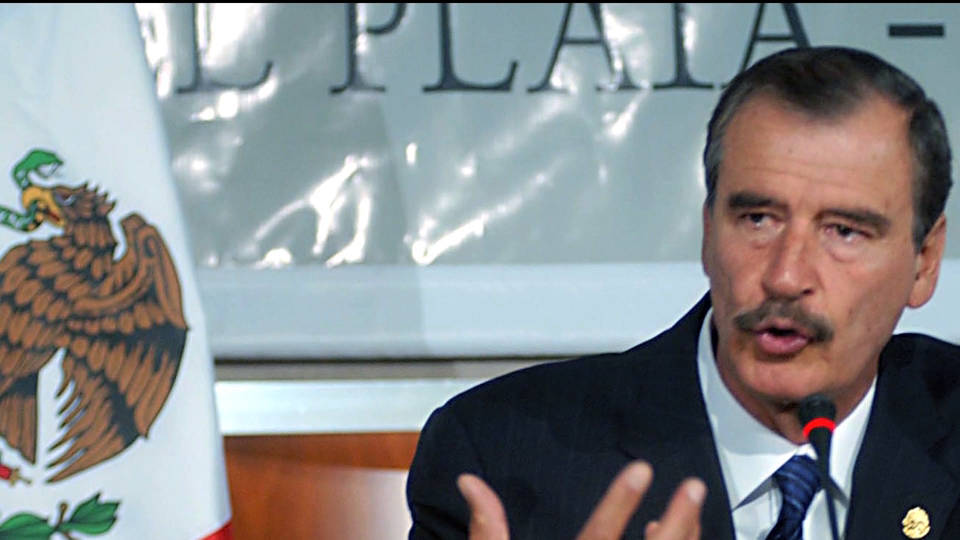
The five remaining Republican presidential candidates debated in Houston, Texas, Thursday night in their final showdown before Super Tuesday. Candidates Marco Rubio, Ted Cruz, John Kaisch and Ben Carson all attacked front-runner Donald Trump, who has won three out of the four primaries and caucuses to date. This comes as former Mexican President Vicente Fox spoke out in an interview with Univision and Fusion host Jorge Ramos about Trump’s repeated calls to build a wall on the U.S.-Mexico border, which Trump says he would make Mexico pay for.
Vicente Fox: "I declare, I’m not going to pay for that [blee] wall. He should pay for it. He’s got the money."
Jorge Ramos: "Are you afraid that he’s going to be the next president of the United States? What would that mean?"
Vicente Fox: "Not at all. Not at all."
Jorge Ramos: "What would that mean for Mexicans?"
Vicente Fox: "Not at all. Democracy cannot take us to crazy people that doesn’t know what’s going on in the world today."
TOPICS:
Mexico
2016 Election
Fmr. KKK Grand Wizard David Duke Urges People to Support Trump
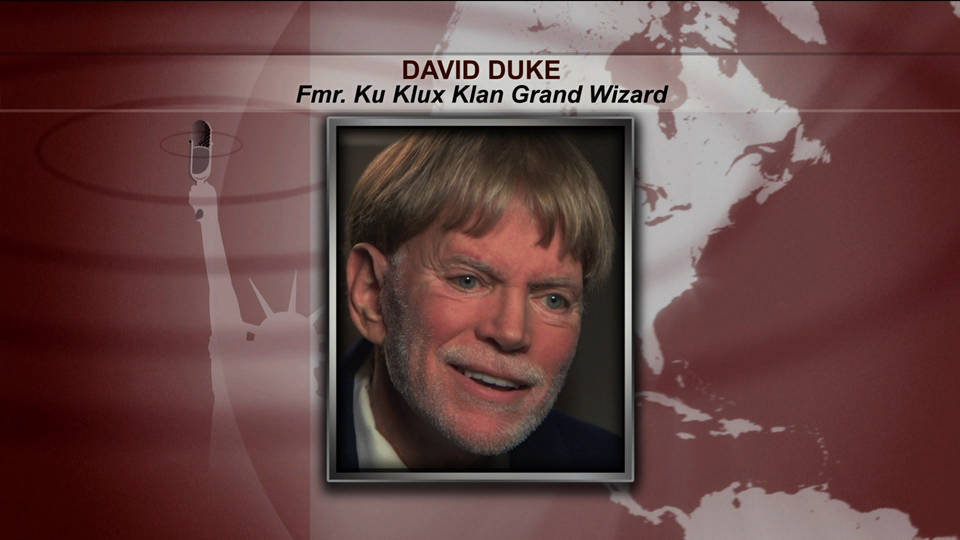
Meanwhile, white nationalist and former Ku Klux Klan grand wizard David Duke is using his radio program to urge listeners to support Trump, saying Wednesday, "voting against Donald Trump at this point is really treason to your heritage." Duke went on to encourage listeners to go to Trump’s headquarters to volunteer, saying, "Go in there. You’re gonna meet people who are going to have the same kind of mindset that you have."
TOPICS:
White Power
2016 Election
Ted Cruz Says He'd Pardon Anti-Choice Activist David Daleiden
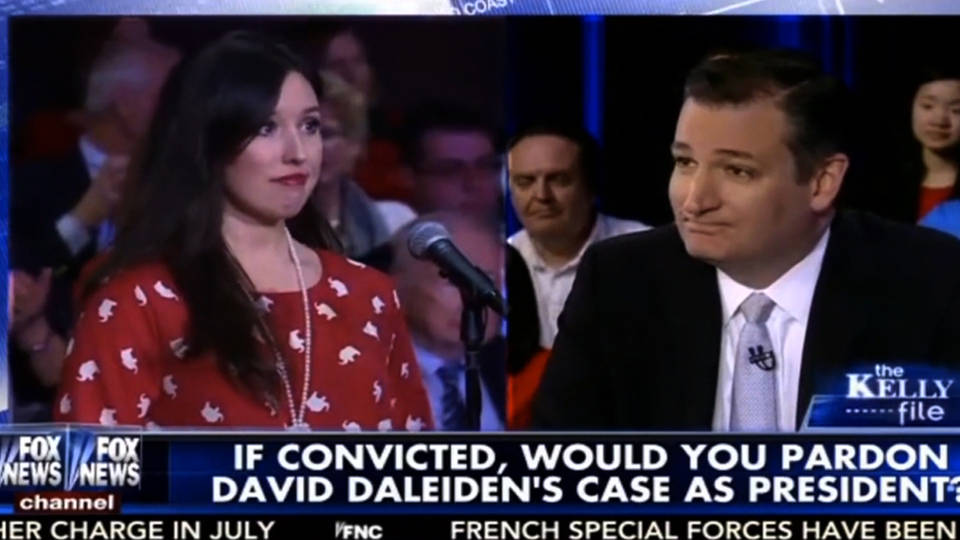
Meanwhile, Republican presidential candidate Ted Cruz has said he would pardon David Daleiden, an anti-choice activist who was indicted by a Texas grand jury last month on charges stemming from the highly edited videos he shot undercover at Planned Parenthood. Cruz made the remarks in response to an audience member’s question during a special edition of Fox News’ "The Kelly File" Wednesday night.
Lauren: "If David Daleiden’s case became a federal one, would you pardon him?"
Sen. Ted Cruz: "Lauren, thank you for asking that question. The answer is yes. ... And I’ll tell you this. I pledge that if I’m elected president, on very first day in office I intend to instruct the U.S. Department of Justice to open an investigation into Planned Parenthood and to prosecute any and all criminal conduct by that organization."
TOPICS:
2016 Election
Abortion
Louisiana: Anti-Choice Law Threatens to Leave Only 1 Clinic in State

Meanwhile, in Louisiana, the Fifth Circuit Court of Appeals has allowed an anti-choice law to take effect, which could shutter nearly all abortion clinics in the state. Louisiana is one of multiple states that have passed laws requiring abortion providers to obtain admitting privileges at a nearby hospital. Such privileges are often impossible for abortion providers to obtain, due to anti-choice sentiment or because they don’t admit enough patients to meet hospital minimums. Speaking on a conference call with reporters Thursday, attorney David Brown of the Center for Reproductive Rights said the ruling will likely shut down all but one clinic.
David Brown: "When the law was passed, there were five abortion clinics throughout the state offering services to women. Three of those clinics have now closed because they cannot meet the admitting privileges requirement that the Fifth Circuit allowed to take effect last night. The fourth clinic is hanging on by a thread with one physician, who will have to cease providing services unless we can get immediate relief from the Supreme Court. So, the Fifth Circuit has—the decision yesterday has poised us to go from five clinics down to one."
The Center for Reproductive Rights said it would seek emergency relief from the Supreme Court. The decision came a week before the Supreme Court hears arguments Wednesday concerning another ruling by the Fifth Circuit Court of Appeals that upheld anti-choice restrictions in Texas, including a similar admitting privileges rule that has shuttered about half of Texas’ roughly 40 clinics.
TOPICS:
Abortion
More U.S. Special Ops to Advise Nigeria in Fight Against Boko Haram

The Pentagon says it’s planning to send dozens of U.S. special operations troops to the front lines of Nigeria’s fight against the extremist group Boko Haram. The Pentagon says the U.S. soldiers would serve only in noncombat advisory roles helping the Nigerian military. Human Rights Watch and other groups have accused the Nigerian military of burning hundreds of homes and committing other abuses in the fight against Boko Haram.
TOPICS:
Nigeria
Syria: Heavy Airstrikes Hours Before Ceasefire Slated to Take Effect

The Syrian Observatory for Human Rights says at least 10 rounds of airstrikes hit the rebel-held town of Douma to the east of Damascus Friday morning, only hours before a U.S.- and Russian-brokered plan to stop the fighting is slated to take effect. The two-week "cessation of hostilities" is set to begin at midnight. The Assad regime, a coalition of opposition groups and the U.S. and Russia have all agreed to the two-week halt to the fighting. Groups like ISIL and al-Nusra are not included in the brokered agreement, and strikes against these groups are expected to continue. On Thursday, President Obama said the U.S. is committed to the plan to ease fighting, but that there are "plenty of reasons for skepticism."
TOPICS:
Syria
France: Judge Says Evictions at Calais Refugee Camp Can Move Forward

In Calais, France, in the largest refugee camp in the country, refugees say officials began telling people to move out this morning, after a judge ruled Thursday that French authorities can move forward in evicting as many as 3,000 refugees. French authorities want the refugees to move into shipping containers or to be dispersed to refugee centers across France. To see our coverage of the refugee camp when Democracy Now! visited there, go to democracynow.org.
TOPICS:
France
Refugees
Medical Care Violations Played Role in 8 Deaths in ICE Detention Centers

Meanwhile, in the United States, a new report by the ACLU and other groups says violations of medical care standards played a role in at least eight deaths inside U.S. immigrant detention facilities between 2010 and 2012. The report includes cases in which one man died of a heart attack after officials waited more than an hour to call 911, while another died of a preventable heart disease after his pleas for medical care were ignored for four months. In another case, a woman died after authorities gave her the incorrect dose of her medicine, even though she submitted multiple health services requests before her death, including one in which she wrote, "I am not being given the full dosage of my medications."
TOPICS:
Immigration
SeaWorld Admits Sending Employee to Spy on PETA

The animal theme park SeaWorld has acknowledged that it sent an employee to pose as an animal rights activist—nearly six months after the group PETA, People for the Ethical Treatment of Animals, accused the SeaWorld employee of spying. Writing in a blog post on Thursday, SeaWorld’s chief executive Joel Manby said that the board has "directed that the company’s management team end a practice in which certain employees posed as animal rights activists." SeaWorld also acknowledged that the employee, Paul McComb, has returned to work. According to PETA, McComb took part in numerous PETA protests against SeaWorld while undercover and repeatedly used social media in an effort to incite other activists, stating that it’s time to "grab pitchforks and torches" and time to "burn SeaWorld to the ground."
TOPICS:
Animal Rights
Cancer Patients Who Protested TPP Arraigned in D.C. Court
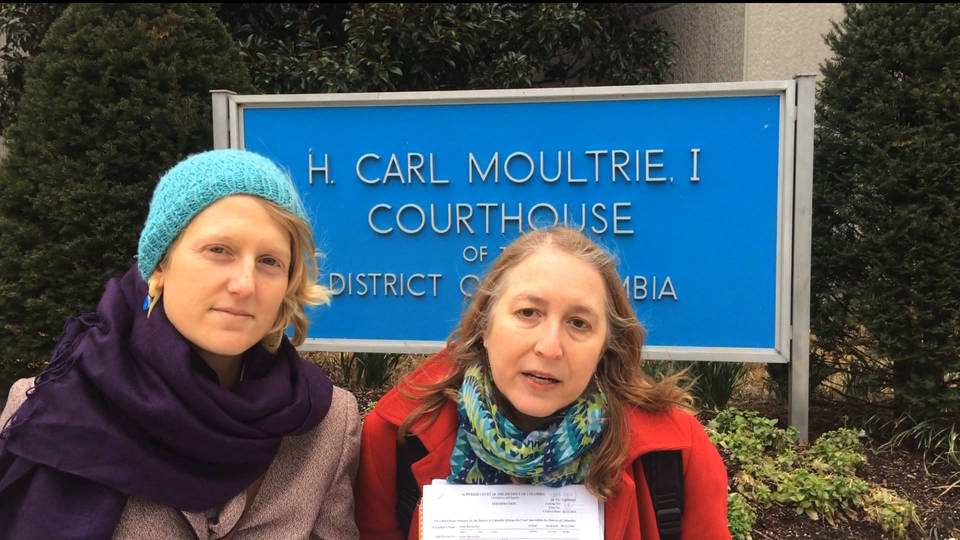
In Washington, D.C., cancer patients Zahara Heckscher and Hannah Lyon were arraigned Thursday on charges stemming from their February protest against the Trans-Pacific Partnership, known as the TPP, and its so-called death sentence clause, which would extend drug company monopolies on medicines. Zahara Heckscher spoke after their arraignment.
Zahara Heckscher: "We’re going to keep fighting against the TPP, keep fighting to get the word out about the danger of the TPP for people with cancer and people who need access to medicines in the U.S. and around the world. So we’re going to keep fighting, even though we have to deal with the criminal justice system. That’s OK. We’re going to keep the struggle going."
TOPICS:
TPP
Inside Climate News, Jamie Kalven & Brandon Smith Win Izzy Award
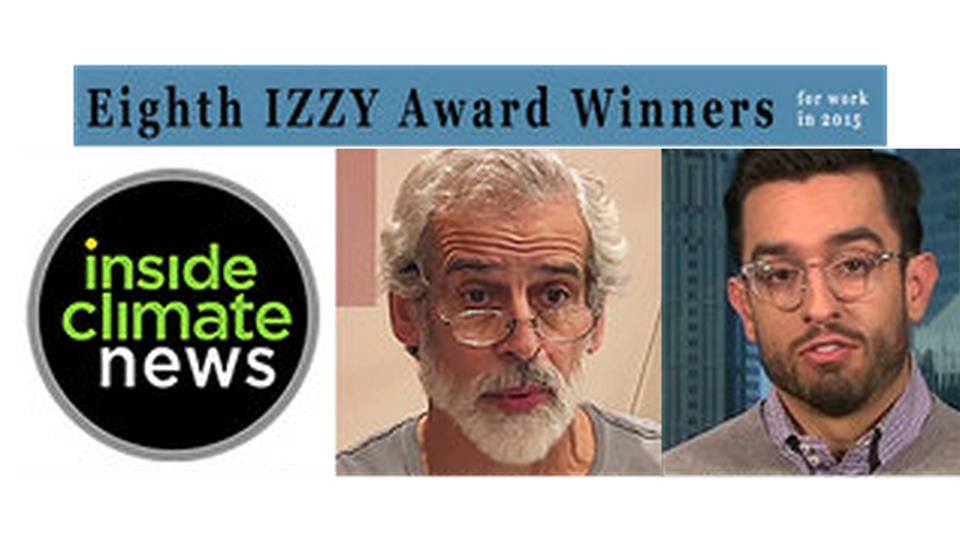
And the nonprofit news organization InsideClimate News and independent journalists Jamie Kalven and Brandon Smith have won this year’s Izzy Award, presented by the Park Center for Independent Media and named for legendary dissident journalist I.F. Stone. InsideClimate News won for its investigative series, "Exxon: The Road Not Taken," which chronicles how Exxon knew about climate change as early as the 1970s. Jamie Kalven of the Chicago-based news outlet the Invisible Institute and freelance journalist Brandon Smith won for their reporting on the Chicago Police Department’s killing of African-American teenager Laquan McDonald.
TOPICS:
Journalism
Amy Goodman to Be Inducted into I.F. Stone Hall of Fame
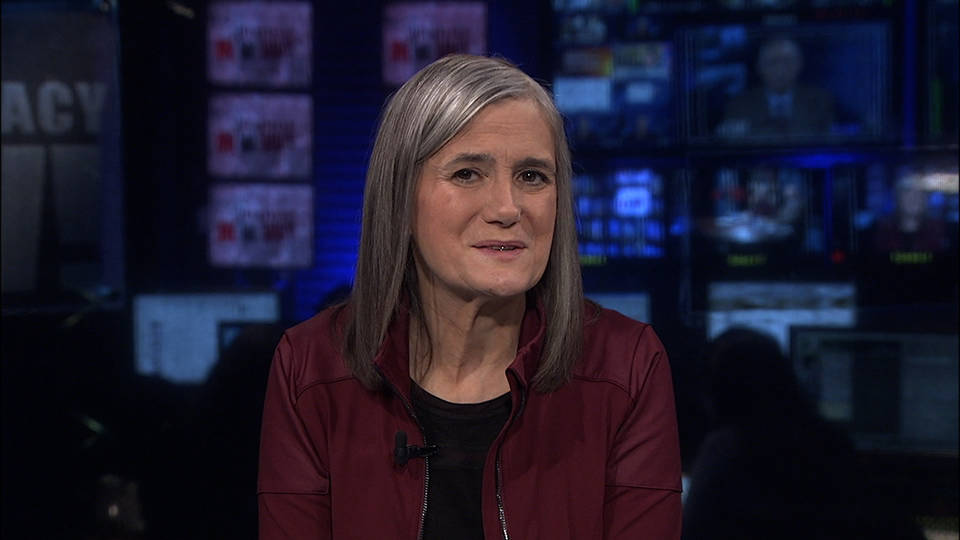
Democracy Now! host Amy Goodman will be inducted into the I.F. Stone Hall of Fame. Amy Goodman joins prior I.F. Stone Hall of Fame inductees Glenn Greenwald and Jeremy Scahill.
TOPICS:
Journalism
Donate today:
Follow:

"Thirsty for Democracy: The Poisoning of an American City": Complete Democracy Now! Special on Flint
WEB EXCLUSIVE

Calls Grow for Wendy's to Join Fair Food Program as Coalition Plans Major Protest of Fast-Food Giant
COLUMN

Part 2: Former CIA Agent Barry Eisler Turned Writer on Imagining/Predicting Gov't Surveillance
WORK WITH DN!

Part 2: Freed from Detention in Bahrain, U.S. Journalist Describes Interrogation & Ongoing Crackdown
---------------------
207 West 25th Street, 11th Floor
New York, New York 10001, United States
---------------------
---------------------






No comments:
Post a Comment